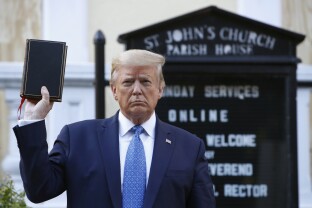A new Trump administration memo concerning religious expression in the workplace allows federal workers to proselytize their colleagues.
The document, from the Office of Personnel Management, includes a list of some actions that should not result in disciplinary action. One states: “Employees may engage in conversations regarding religious topics with fellow employees, including attempting to persuade others of the correctness of their own religious views, provided that such efforts are not harassing in nature.”
“Employees may also encourage their coworkers to participate in religious expressions of faith, such as prayer, to the same extent that they would be permitted to encourage coworkers [to] participate in other personal activities,” the document continues.
It carves out some protections for those who don’t want to participate in those discussions, however, stating that “unwillingness to engage in such conversations may not be the basis of workplace discipline.”
An example of this is provided in the document appendix, which reads: “During a break, an employee may engage another in polite discussion of why his faith is correct and why the non-adherent should re-think his religious beliefs. However, if the nonadherent requests such attempts to stop, the employee should honor the request.”
Other protected employee conduct includes being able to display religious items (“such as crosses, crucifixes and mezuzah”) on their person and in their assigned workspace, and both individual and group religious expression like prayer (while not on duty).
The memo “affirms longstanding constitutional and statutory protections for religious
Expression,” an OPM press release about the memo said. The memo follows a February executive order from Trump on “eradicating anti-Christian bias.”
“My Administration will not tolerate anti-Christian weaponization of government or unlawful conduct targeting Christians. The law protects the freedom of Americans and groups of Americans to practice their faith in peace, and my Administration will enforce the law and protect these freedoms,” the executive order reads.
Sign in
Log into your free account with your email. Don’t have one?
Check your email for a one-time code.
We sent a 4-digit code to . Enter the pin to confirm your account.
New code will be available in 1:00
Let’s try this again.
We encountered an error with the passcode sent to . Please reenter your email.


